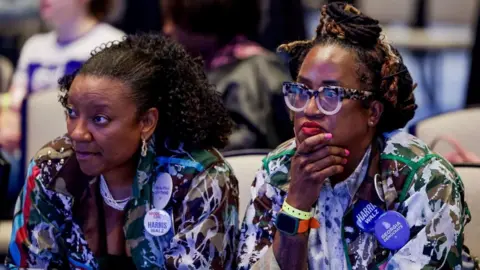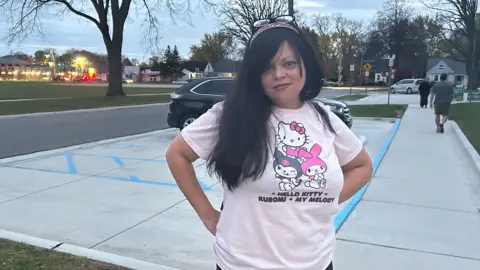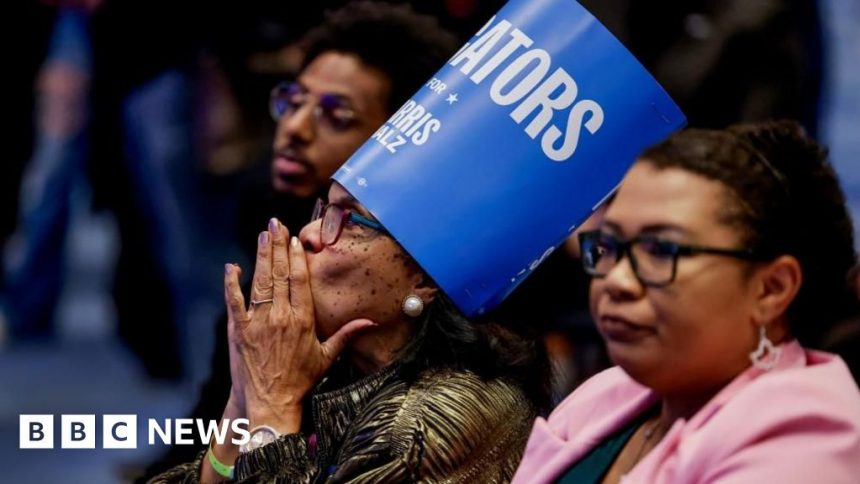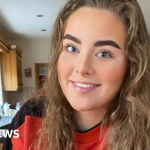BBC reporters on story of the night in swing states
 EPA
EPAAcross most of the seven battleground states expected to decide who will be the next US president – former President Donald Trump or Vice-President Kamala Harris – the race is still too close to call.
On the ground, our correspondents are bringing us the mood from the swing states as results continue to trickle in.

By Madeline Halpert in Dearborn and Ione Wells in Detroit
It’s too early in Michigan to tell which candidate has won, though Donald Trump has a slight lead, excluding most of the votes from the biggest Democratic County of Wayne.
We spent the day speaking with voters across the state, which was on pace to break voter turnout records earlier in the day, Secretary of State Jocelyn Benson said.
A host of issues were pushing people to the polls. For some women, reproductive rights were top of mind, while both men and women raised concerns about the economy.
Yian Yian Shein, a restaurant owner in the Detroit suburb of Warren, said Trump would lower income taxes and boost her small business.
Meanwhile, Tania Slaughter, who lives in neighbouring Oakland County, began crying as she told me about voting for Kamala Harris.
“It’s time” for a woman president, she said.
At a watch party in Detroit, we’ve been speaking to a couple of Democrat donors and strategists past and present.
There are increasingly a lot of nerves in the room, with some saying privately they’re feeling “very pessimistic”.
Now, of course there’s a bit of expectation management going on and, with a race this close, that’s in part because the supporters here don’t want to get their hopes up while the margins are so tight.
We’re expecting to know the result of the race by midday on Wednesday – perhaps even earlier.


By Brandon Drenon, Raleigh
Voters in North Carolina feel the weight of being a closely watched battleground state.
“It’s exciting but it’s also a lot of pressure,” one woman told the BBC.
She is a freshman at University of North Carolina (UNC) and had just cast her ballot in her first presidential election, alongside three friends, who are also freshmen voting for the first time.
The group didn’t want to say who they were voting for, or give their names, they said, because of how “very polarised and divisive” US politics are.
This was a common response across the state expressed by anxious voters.
Immigration was the students’ main concern, they said, an issue that Donald Trump emphasised throughout his campaign.
From the mountains of western North Carolina, to UNC in Chapel Hill over 200 miles away, immigration was a major focal point for many voters in the state – a good sign for Republicans.
The mood at the North Carolina Democratic watch party in Raleigh earlier on Tuesday was very festive – there was a marching band, a DJ, free-flowing cocktails, and lots of smiles.
By late night the crowd had noticeably fizzled out and quieted. Trump had just been projected winner in the state.
Some were trying to maintain optimism.
Stephanie Pigues, a Wake County voter, says “we can’t take any county for granted”.
“Until every vote is counted, we are excited. That’s what Democracy is.”

By Bernd Debusmann in Allentown
There was a mood of cautious optimism as the night wore on in Allentown, Pennsylvania – a majority Latino city which was the scene of intense campaigning from both Harris and Trump.
At a watch party organised by Republican House candidate Ryan Mackenzie, drinks were free flowing and, early on, Trump supporters were encouraged by signs that he was doing well in the state. At every sign that Trump gained ground, the crowd erupted into loud applause and chants of “Trump” and “fight”.
Speaking to Trump supporters at the rally, several common themes emerged: the economy, and a perception that drugs and crime are flowing across the US-Mexico border.
In the days and weeks after this election, much of the focus will be on the state’s Latino voters, and the impact that they had on the outcome, with early data suggesting that Trump – for the third consecutive election – overperformed among that electorate.
For many Latinos in Pennsylvania, it comes as no surprise. Their concerns, they said, are the same as the wider US population.
“We liked things, the economy, better four years ago,” said Samuel Negron, a Pennsylvania state trooper and Puerto Rican-American. “You pay $5 for a dozen eggs now. It was much less before. A lot of us have woken up.”


By Carl Nasman in Madison and Mike Wendling in Milwaukee
We are at Democratic Senator Tammy Baldwin’s election night party in Madison, Wisconsin.
A cheer went up in the room when early results flashed on the large TV screen here, showing Baldwin leading against her Republican challenger Eric Hovde.
But moments later the state’s Lieutenant Governor, Sara Rodriguez, took the stage with a bit of a reality check.
“Let me level with you: we likely won’t see (final) results until much later,” she said. “This is normal. This is what we expect in Wisconsin.”
Ms Rodriguez further noted that there are still people waiting to vote in Wisconsin.
The Baldwin campaign said they are settling in for a long night.
In Milwaukee, there is a dispute over around 30,000 ballots that had to be re-run through tabulation machines.
The state’s Republican Senator Ron Johnson accused election workers of being “sloppy”.
But Paulina Gutierrez, head of the city’s Election Commission, rejected those charges and told reporters: “We have nothing to hide here.”
“Every ballot that was here that was legitimate was counted, it was counted accurately, it was tracked, there is a paper trail, there is a chain of custody and we are going to get this done,” she said.

By Christal Hayes in Phoenix
The count here in the swing state of Arizona is likely to go on for days.
At the Democrats’ watch party at a Hyatt hotel in Phoenix, large TVs showed MSNBC and music blared from big speakers throughout the evening but the sing-a-long tunes and vibrant beats weren’t enough.
Optimism seems to be cracking with each state projected for for Trump. The line for the bar wraps through the ballroom.
As Trump was declared the winner in the swing state of North Carolina, a collective sigh filled the ballroom.
Wade Sumner, 25, continued to refresh his phone. Ruth Garcia, 25, let out an exhausted “how?”
Each person at their small table – which was filled with already empty alcoholic drinks – was glued to their phones, each with a different news outlet’s feed on election results.
“We’re still hopeful,” Mr Sumner said.
Jocelyn Guzman, 26, chimes in with a reminder.
“I mean, this is how we felt in the last election. It took forever to really know,” she said. “That doesn’t mean it isn’t anxiety inducing.”
I asked them about the prospect of another Trump presidency and each of their faces fell.
“It’s unimageable,” Mr Sumner said.
Along with the presidential race, the issue of abortion is on the ballot. A key Senate race will also be decided that could decide what party controls the upper chamber of Congress.

By Lily Jamali in Las Vegas
The mood in Nevada on Tuesday was buoyant.
There is also a sense of anticipation.
It’s become clear that the Silver State could hinge on the ballots of independent voters.
At a voting centre at Allegiant Stadium in Las Vegas, multiple voters cited housing affordability as an issue that’s driving them to the polls.
But voters named different candidates when asked who could address the problem.
“Everybody’s coming to Las Vegas and real estate agents are taking advantage. It affects us,” said Daniel Bueno, a US citizen who is originally from Colombia.
Mr Bueno has been moved by the Trump campaign’s argument that immigration is to blame for the high cost of housing.
But 26-year-old Olympia Aguilar said Vice-President Kamala Harris’s policy proposals – including $25,000 in down payment assistance for first-time homebuyers – would help people like her who are trying to enter the market.
“She makes that option seem available to us,” Ms Aguilar said. “I could grow and move forward with my life instead of just trying to get by,’
Election officials will count ballots mailed on Tuesday if they arrive by week’s end.
There are also about 14,000 ballots that may have missing or mismatched signatures, according to Nevada Secretary of State Francisco Aguilar.
Nevadans have until Tuesday to fix such issues so it might be a while before there’s a final result – most ballots in this state still have to be counted by the early hours of Wednesday morning.

By John Sudworth in Atlanta
As Georgia was called for Trump it was the icing on the cake for the Republican watch party here in Atlanta, where many of those in Maga hats, and others in Stetsons, have been pumping the air and whooping for joy all evening.
It was the second swing state to be called and another big stepping stone on Trump’s planned route to White House via the southern swing states.
There are some promising signs for Republicans in the detail too, with Trump boosting his support in rural counties where he was already very strong, and even picking up a few votes in some of the urban counties.
Georgia had promised an early result – it came perhaps not quite as early as they’d hoped – but no matter for the state’s Republicans. They are jubilant.








